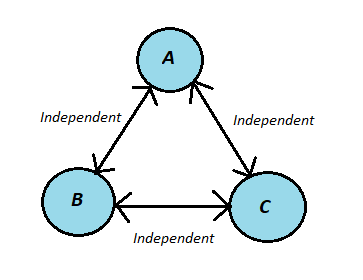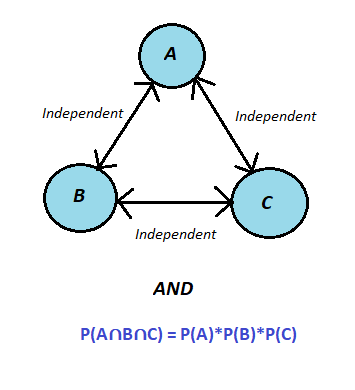Three or more events are said to be pairwise independent if they are independent when considered two at a time. Two events are independent if the probability of occurrence of one event does not depend on the occurrence or non-occurrence of the other event.
Pairwise independence for 3 events:
Suppose you have three events A, B, and C. Then being pairwise independent means that they are independent taken two at a time. This means:
- Events A and B are independent.
- Events A and C are independent.
- Events B and C are independent.

Note that this does not mean that the three events A, B, and C considered altogether are independent (that is the much stronger notion of mutual independence).
Pairwise Independence and Multiplication Rule:
If the events A, B, and C are pairwise independent then we can apply the multiplication rule. The multiplication rule in probability states that if two events are independent then the probability that they occur simultaneously is equal to the product of their individual probabilities. Hence,
- P(A∩B) = P(A)*P(B)
- P(A∩C) = P(A)*P(C)
- P(B∩C) = P(B)*P(C)
In fact, the above three conditions form the mathematical definition for pairwise independence for three events.
Example:
Suppose we toss three different coins. Let A, B, and C denote the events that we get heads on the first, second, and third coin respectively.
Then the three events are pairwise independent because the probability of getting heads on one of the coins does not depend on whether we got heads or not on another coin.
Let us check that the events are pairwise independent using the mathematical definition given above.
Step 1: The sample space is S= {HHH, HHT, HTH, THH, TTH, THT, HTT, TTT}
Step 2: A= {HHH, HHT, HTH, HTT} since we want heads on the first coin and hence P(A) = 4/8 = ½
Similarly, P(B) = P(C) = ½
Step 3: Now, A∩B= {HHH, HHT} since we want heads on the first and second coins and hence P(A∩B)=1/4
Step 4: We verify that P(A∩B)=1/4 = 1/2*1/2 = P(A)*P(B)
Similarly we check that P(A∩C) = P(A)*P(C) and P(B∩C) = P(B)*P(C)
Since all three conditions are satisfied we conclude that the three events are pairwise independent.
Mutually independent Events:
The notion of pairwise independence must not be confused with the notion of mutual independence. Three or more events are said to be mutually independent if any two or more combinations of them are mutually independent.
Hence mutually independent implies pairwise independence but the reverse is clearly not true.
Three events A, B, and C are mutually independent if:
- They are pairwise independent.
- P(A∩B∩C) = P(A)*P(B)*P(C)
